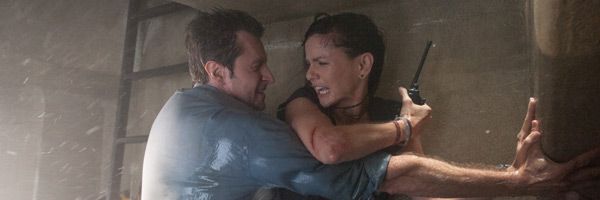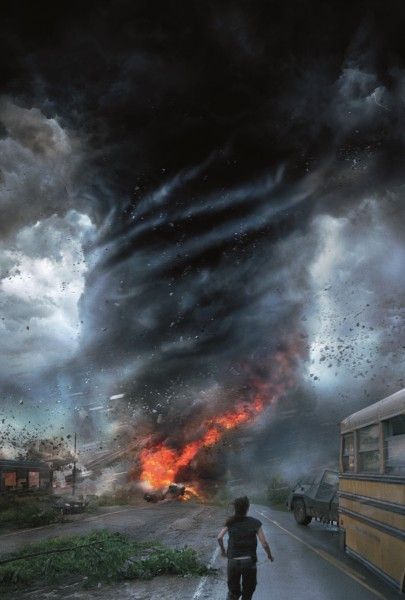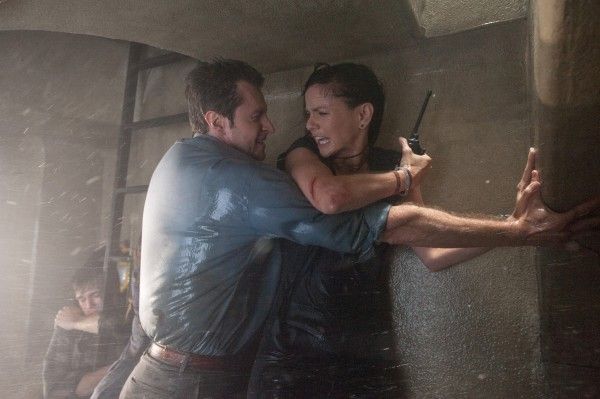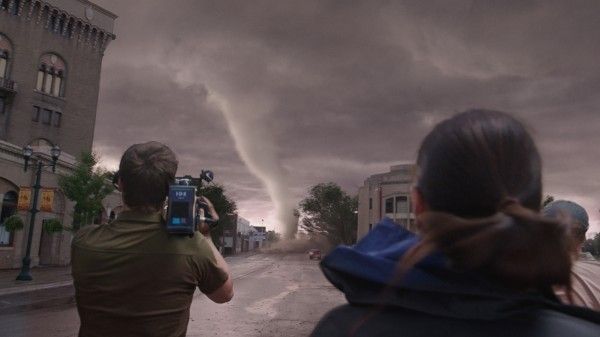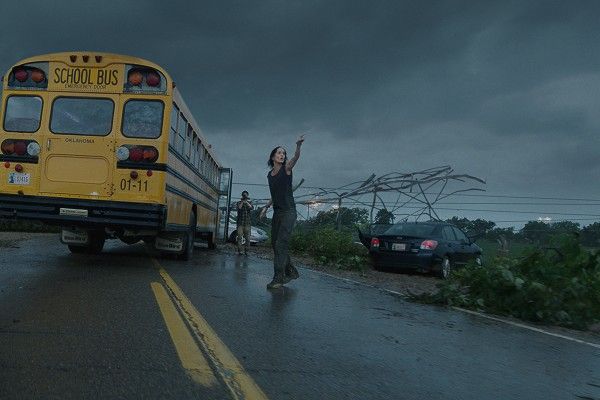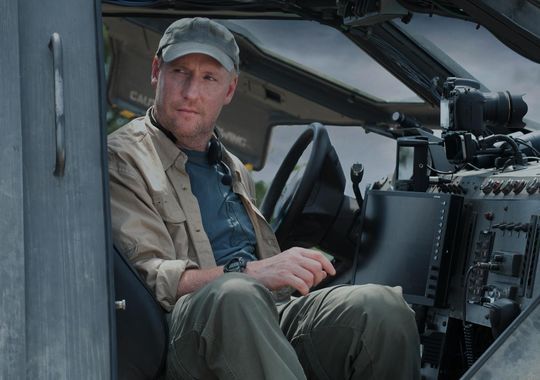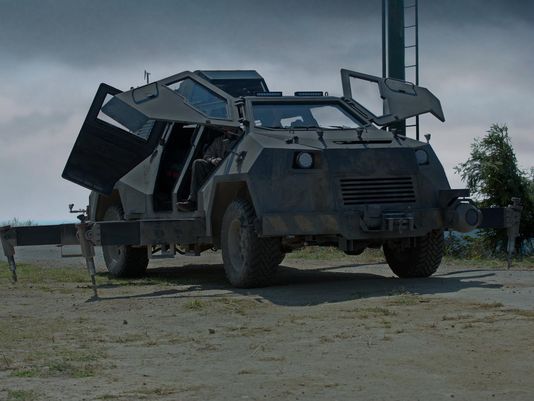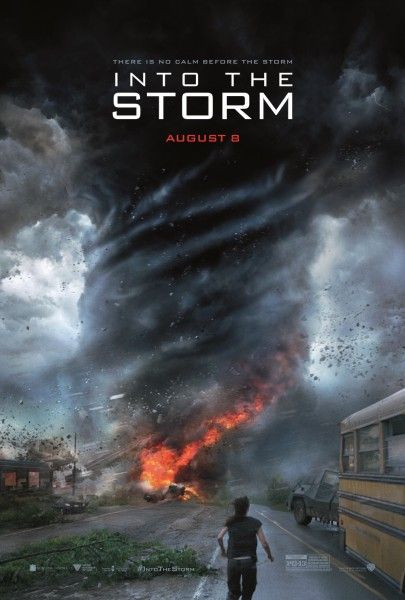While you may recognize Richard Armitage from his role in The Hobbit movies, the English actor gets to enjoy a shorter make-up time and a taller stature in Steven Quale's tornado picture, Into the Storm. Serving as the film's male lead, Armitage plays the more down-to-earth but no less heroic Gary Morris, a high school vice principal and football coach who must track down his missing son after a tornado rips through their small town.
While on the Detroit set, I joined a small group of visiting journalists in interviewing Armitage about his character, his motivation and preparation, and the activity level his role required. He also teased a bit about his experience filming Peter Jackson's fantasy films. Also starring Sarah Wayne Callies, Matt Walsh, Alycia Debnam-Carey, Arlen Escarpeta, Max Deacon, Nathan Kress, Jeremy Sumpter, Kyle Davis, and Jon Reep, Into the Storm opens August 8th. Be sure to check out the film's recently released trailer here. Hit the jump for more from Armitage. Spoilers follow.
Can you tell us who you play and how he fits into the storyline?
Richard Armitage: My character is called Gary Morris. He’s the vice principle of Silverton High School. He’s got two boys, Trey and Donnie. He’s asked them to create a video diary of the graduation ceremony. So they’re going to make a time capsule video diary of the town and then this storm comes and the two boys get separated. Through the story Gary’s mission is really to try to find out where his son has got to. Because he can’t communicate with him, he’s lost contact and he’s got Trey with him so he’s trying to juggle two things: protect the older son and go in search of the younger son. But yeah, he’s an English teacher. I kind of decided as we were shooting that he was also the football coach because I needed kind of a level of fitness that wasn’t particularly extraordinary but the ability to run and kind of shout quite loudly. And it was the dialect coach told me you do sound like you coach the football team so I said okay that will go in the biography as well. So yeah preparation wise I started to look at the science behind tornadoes and then I sort of decided that I would quite like to be caught unaware by it rather than knowing too much. I wanted him to get caught up in the shock factor of what the tornado was rather than understand it in the same way the guys in the weather van do. But I looked mainly at the idea of a guy who is a normal guy and every man who is forced into a situation where he has to become heroic for a day to save his sons. And he has to effectively do that thing that we all hope have in us which is to run into a burning building and save a child, to dive into water to save a child. But nobody knows if we have the potential until you’re faced with that situation. And before you realize you’re becoming a hero, it’s already happened. And this is all in a space of a day so that’s really the center of my character. He’s a very normal, ordinary guy who gets called upon to be a hero.
Is that struggle internal for you as a performer or do we see some moments of, "Can I do this?"
Armitage: Um, no. I didn’t really want to have that kind of dialogue. I think he’s already doing it before he would even question, "Can I do this?" Because the events escalate so quickly and they have to make decisions so quickly that…actually there are a couple of moments where he makes some quite difficult decisions one of which is with Trey in tow. Because as he kind of goes out to save Donnie, Trey is insistent that he go with him and he’s taking his son out into this very dangerous environment and I don’t know why he’s bringing him along, he just kind of feels that to have him come along and be close to him in these circumstances where the storm is so unpredictable I think it just felt right in that single moment to say okay you stay with me, we’re going to go out and face this storm. If you’re next to me I feel safer than if I leave you somewhere. So it’s those kind of decisions where you think logically, you wouldn’t do that but in the moment of extreme circumstances there’s an instinct, which kicks in, and I just wanted to look at all those instincts.
Since this is a found footage film how are the scenes you’re in captured?
Armitage: Well this is one of the reasons why Trey comes with me is because he has the camera. But of course you have to…that’s the game of the film. You have to acknowledge that and then ignore it. But each camera becomes a character. There’s times where my son isn’t in the scene but his camera is and I have to talk to him as if he’s there. But it’s a camera operator. So each camera becomes a character. Some of them are surveillance cameras. So you have to know very specifically that you don’t start talk to a surveillance camera like it’s a person. So it’s very unusual. I’ve never filmed like this before. There are no formal set ups and the lighting is obviously to look like it’s not lit. There’s no such thing as a close up unless Trey or Donnie is doing a punch zoom. But I don’t know what size the shots have been. I always know what lens we’re on whether it’s mid or tight. I’ve not asked that question because I think I actually don’t want to know in this instance because I want it to kind of be captured and found rather than having any control over how the performance is. Which is why it feels like there is no performance. That’s a good thing. It’s a different kind of work, it’s sort of uber-naturalism. Although at the same time you build your relationship with your camera operator that you can create the illusion that just finding a moment, which does involve that kind of choreography with the camera. Otherwise they’re always on the back of your head as you run away.
How challenging is that?
Armitage: Well you spend, because I’ve spent most of my film career working on exactly the opposite. Like working for the camera, how to let the camera in, let the camera be part of the scene and effectively with this you have to do the opposite, you have to ignore them. At times you have to...I have to ask Trey to put the camera down and sort of push the camera out of the way so it’s sort of an avoidance of the camera. And also there are two characters, myself and Allison who never pick up a camera because we’re not particularly interested in the storm, we’re at odds with the storm. Whereas a lot of the other characters are like I’ve got to capture this. So that’s been very interesting. Gary I guess is kind of anti camera. I think the most interesting scene was a scene in the kitchen before the story really kicks off. Before the storm kicks in. And there’s a scene with my two sons at the breakfast table and we realize by the end of the rehearsal that there’s only going to be one take on one camera because we’re in his home. There are no other cameras but the video camera shooting. So it’s one take with no cutaways, no editing. Which is good. It felt very real.
So how much does your character interact with the others?
Armitage: It’s interesting, he gets into a situation where he meets Allison who’s the sort of professor of the weather team and they are forced into a situation where he effectively, this is what they are shooting today, he sees a girl in the street caught in the storm and grabs hold of her and saves her life so they’re instantly thrust into this relationship with each other. Which is the kind of thing that you cant predict, you can’t explain and it’s that tight bond when two people have been in that situation I think it becomes a life long bond you can never shake off. I think you have the same thing with patients and doctors or patients and donors. People that have intervened in someone’s life. It kind of fuses them together. And part of the story is that Allison really assists Gary in finding his son. And they both have children, they’re both single parents and I think that relationship is probably the strongest relationship. It’s not a manipulated relationship, it’s not something that either character realized they’re in a relationship with each other. That’s the thing about this story that the characters have no real consciousness of what’s happening to them. It would probably be weeks later before they realized that I’ve just been through something extraordinary. This is about the events happening for eight hours and there is no reflection, which is really strange for an actor to prepare for because you’re just dealing with literally what’s in front of you second to second.
So this takes place all in one day?
Armitage: Probably in the space of four to six hours, so just one costume.
Speaking of costumes is it refreshing to not have dwarf armor and hair and beard?
Armitage: Yeah, ten minutes in the make up chair is great. Although I like the whole transformation thing because it belongs to somebody else. My face was never my own and then when you’re using your own face again, my face needs a bit of work.
Do you ever feel phantom limb but for the hair?
Armitage: It was the head because we had this kind of latex head, which was so hot so I don’t miss any of that. But then you’re faced with a whole other set of discomfort of being constantly wet and effectively standing in front of a jet engine from a Boeing 747 for two weeks. Out of the frying pan and into the fire. A couple of shoot days, I think it was two nights ago, we were running across the parking lot of the garage and the wind machines were so strong I was literally running on the spot not going anywhere. We were like can you just turn it down a little bit?
How active does the performance get?
Armitage: Pretty active actually. We’re going to do a lot of wirework, we haven’t quite got to that point yet. I think we’re doing that one day where Allison gets kind of sucked up into the tornado. I’ve got a bit of tank work to do. It’s always water. It wasn’t in the script when I agreed to it. It’s like he dives into a tank of water to save his son. My worst nightmare. And this is the thing I’m really conscious of: I didn’t want him to suddenly turn into an action hero because that’s a little bit predictable. I wanted him to be struggling with that. I kind of wanted him to run in a slightly different schoolteacher kind of way so he runs different from how I run.
Like Girly?
Armitage: He’s not girly but because he’s wearing kind of loafers. He’s wearing loafers and a suit. He runs like a math teacher or English teacher would run. But there’s a lot of running so you’ve got to think okay do I want people to think he’s a rubbish runner? There’s a fine line. I just didn’t want him to look like he suddenly ripped off his suit and become an action hero because that would be uninteresting.
It seems like he’s the kind of teacher everyone recognizes.
Armitage: Yeah as soon as we break away from the high school one of the responsibilities of that character, especially when you are the vice principal is an expectation of safety. And that’s weighed heavily on the character’s mind when he kind of gets all of the students, with the assistance of the principal, into the storm shelter, he’s directing people back to the school because it’s a storm shelter and then when he realizes that the storm is such a strong storm that actually they need to get away from the area, the building is getting ripped apart, devastated. SO all those kids relied on his trust are actually at risk now because he’s put them all in this place where the storm is heading directly to, so yeah I think you have to accept that responsibility. It’s not like he’s a fire fighter or a lifesaver. He’s just a teacher. It was funny, when we shot that day it was 800 extras all getting absolutely soaked all day just sitting there smiling. And I really felt responsible for them and I was like when that storm goes and the sirens go off I’m going to try to escort everyone off the football field and there were people slipping and sliding all around. Some guy lost his flip-flops and I was like let me help you with your shoes. And I really felt that responsibility to make sure that they would be saved so yeah there’s not really been a lot of moments where I’ve had to imagine stuff or create stuff, it all feels very real.
So this theoretical town is it a tight knit community?
Armitage: Yeah I think so. It’s a relatively big school. I think kids come from quite far around. But yeah I do think it’s a tight knit community. And actually the relationship where the principal, Walker, is key to that because Gary, he has a hard time. He’s the vice principal but the principal gives him a hard time. There’s a big expectation for him to create a great day where the graduation ceremony runs like clockwork and it’s all on his shoulders. And he’s looking at the weather reports about a huge storm coming in and I’m saying come on we should really take this inside. And he’s like no we’re going to do it on the football field.
Did you base this on any teachers?
Armitage: I went to a couple of comprehensives in England and actually I did have teachers in mind. That was back in the seventies. I did, it’s funny when you’re thinking about preparing teachers like this there was a deputy headmaster that I had in my head. Actually no, he was a history teacher and a sports teacher called Mr. Branchflower. It’s a strange name. That was his name. He was a bit of a dude actually. He was the kind of guy…he was a history teacher so he sat there with his geeky glasses on but yeah if you got into trouble he’d be the guy that would jump in and he was in my head.
What school did you go to?
Armitage: Brockington College in Worchester.
Was it hard working with effects?
Armitage: Listen, I’ve just come off a movie where there is green everywhere and there’s like a licorice allsort hanging from a piece of string and someone is saying it’s the biggest most ferocious dragon you’ve ever seen, action! So I’m imagining anything. In fact I probably do imagine it too big. I’m probably going, "My god this tornado!" It’s actually not that big. It’s not dragon sized. But in a way, a tornado is the monster of this movie and you have to treat it like that. It’s unpredictable, it moves around, it gets bigger, it gets smaller, it can swallow you up. So yeah it’s our monster.
Do they play sound effects?
Armitage: They don’t need sound effects. Seriously if you heard the wind machines and the rain machine it’s like you can’t even hear yourself speak. All this dialogue is screaming. The dialogue coach is going to be like you need to tweak that line. How can you hear this?
You were talking before about your relationship with the community, your main story is saving your son, does it ever expand beyond that?
Armitage: No not really. Actually no, there is a point where once Donnie is rescued…Oh I’m giving the story away. Once Donnie is rescued we do go back to the school and we evacuate the kids and that’s when it gets a little bit…it turns into speed. Gary gets in the school bus and kind of drives the kids away. But there was a moment where Alison and I were running towards the bus and were just about to get on the bus and I just thought you know I’ll throw a bit of improvisation there because we should have assumed the guy’s just going to drive the bus. So I kind of said to her do you want to drive and she’s like hell no, you can do it. So it’s kind of like we tried to make it feel like it just happens because he’s standing next to the seat. So he sits in the seat and drives the bus. We try to avoid those set-ups where the big guy gets to drive the bus, why shouldn’t it be her? It's just circumstances that whoever’s closest to that driver’s just gets in and moves that bus away. But hopefully the way that it’s shot, the footage and the speed of the footage will make it feel like everybody is tripping over each other. The events are sort of not even giving them time to make decisions at all. I think that would be excellent.
You said you improvised that line?
Armitage: Yeah there’s quite a lot of improv. Which is great. It’s something we talked about from the beginning. It’s hard to write this kind of thing. It’s hard to write dialogue for an event movie like this where you just don’t know how you’re going to feel at the moment that it’s happening. So yeah there’s been quite a lot.
Is it fun working with Matt Walsh who is literally a master improviser?
Armitage: Is he? Oh right. I haven’t had a great deal of screen time with him. Most of my stuff has been with my boys and Alison. Not been in the Hepatitis as we call it. There are two of them so one is called Hepatitis A and one is called Hepatitis B. I think we come together at some point. I do get into that monster tank at some point but we haven’t shot it yet.
I’ve heard there were musical moments between takes on the Hobbit?
Armitage: Really? When? I have never heard of this. The only thing happened toward the end of the shoot. And we were doing pick ups on Sundays and he did Zombie Sundays, everyone had to kind of wear, well crew, had to wear zombie make up and he played thriller at lunch time. And when we got through they put zombie make up on us and we danced around to thriller.
Be sure to check out our set visit interviews from Into the Storm with the following cast and crew:
- INTO THE STORM: 35 Things to Know about Steven Quale's Natural Disaster Film Starring Richard Armitage and Sarah Wayne Callies
- Director Steven Quale Talks INTO THE STORM, the Film's Timeframe, Shooting from Multiple Perspectives, Interlinking Stories & His Special Effects Background
- Sarah Wayne Callies Talks INTO THE STORM, Insight into Her Character, Intimacy of Trust, Green Screen vs Theater, Wirework Stunts, and Tornado Chasing

